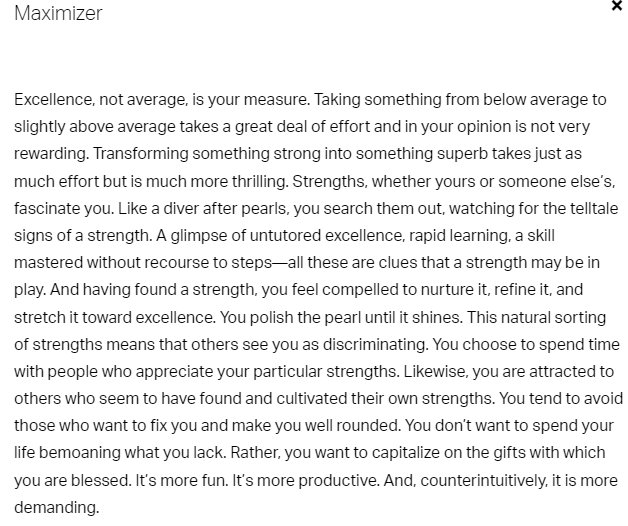Absolutes rarely work for me. I’m the kind of person who looks for the holes in any argument or statement, even my own. Ambivalence and uncertainty is both character flaw but also at times a strength. Yet I know many people, dare I say most people, spend a great deal of time and energy to clearly define their beliefs and place in their worlds. It’s not that I don’t seek this as well, but I’ve always had a hard time staying in my lane.

No matter the place I work, the team I played on, or the organization I belonged to, I always am curious about how and why decisions are made. Depending on how far I was from the top level of that institution, I would find ways to insert myself into the decisions that would impact the whole. And yet I never felt the need to be in charge. Even in sports, I was more comfortable making an assist than I was scoring a goal. A revisiting of strengths finder revealed my top strength was Maximizer.

I wrestle with the apparent dichotomy that often suggests people “stay in their lanes” versus a belief that “we’re all in this together”. Perhaps it’s not a dichotomy but you can see how it might appear that way. The New England Patriots coach Bill Belichek, known for his genius and brevity when it comes to discussing strategy, has famously coined the phrase “do your job” which his players took to heart meaning if you do your job, the team has a chance to succeed. While that’s not exactly the same as “stay in your lane” you can see an overlap. Sometimes “stay in your lane” translates as “mind your own business”. That often comes across as an admonishment but it also can be a call to clarity.
When I began working in the corporate world, I became fascinated with workplace culture. In many ways, this exposure to something beyond schools and school districts brought additional perspective and led to me writing my book. One conversation I had with a colleague who had worked for multiple companies was how she described two different workplaces. The company which she came from was a major tech company that shall remain nameless but it is also the name of a popular fruit. With no judgment, she referred to that company’s culture as very transactional. As she elaborated she said, everyone “stayed in their lane”. This company and its products are known for their elegance and simplicity and I wonder to what degree this culture contributes to that end. Conversely, the company I worked for had more of an entrepreneurial culture where job descriptions were more blurred. Personally, that was what I preferred. I was fortunate to be part of many teams and projects and worked with a variety of people whose main jobs were much different than mine but I believed it helped me better understand my mission and purpose and made the work more meaningful. The downside of this approach of course is there are times when we can spend energy and effort on things that perhaps we shouldn’t or don’t need to. It can easily lack efficiency. That other company has been around for a long time and my guess is they have evolved into a well-oiled machine where roles are clearly defined and if everyone does their job, they should be successful. There are many who prefer this model because of its potential to reduce stress and uncertainty. Going to work every day knowing exactly what you need to do and focus on can be very comforting and for some people, it is necessary to function.
In my current role at ALP as Senior Partnership Consultant, we are working towards greater efficiencies and clearly defining our roles. We are a small enough group that it’s impossible to completely stay in our lanes. It’s both a function of our size but also our collective desire to see us all grow and get better and the degree to which one person’s efforts impact us all.
All this rambling is my way of processing and working to understand how workplace cultures can thrive. It’s a multifaceted endeavor, especially when considering the various challenges that employees may face, such as experiencing mockery during a performance review. By acknowledging and addressing such issues, organizations can cultivate environments where all individuals feel respected and valued. I also am considering what this means for schools and educators. I know schools have shifted from the idea of “my students” to “our students” in an attempt to view all children as a collective responsibility. This is something, that schools can get right, makes a huge difference. Many schools intentionally work to ensure every student has at least one adult that knows and connects with them on a personal level and that need not be their or any classroom teacher. This should take pressure off a teacher who may not be able to adequately relate or connect with their homeroom students. At the same time, I imagine that for many teachers, their load is already maximized and the thought of additional responsibilities might be just too much to handle.
As I’ve written before, I get that this isn’t necessarily a binary question or option but it does matter what you lead with and over time, you might see that a particular bias will emerge.
So I’ll end my post by inviting you to share some thoughts on this idea of staying in your lane. Specifically here are my questions:
-Do you prefer a work environment that leans more towards a collective responsibility or one that defines roles more specifically?
-What examples come to mind as you read this post?
-Have you seen successes or failures as a result of a purposeful choice around this cultural phenomenon?
Would love your thoughts.